#Pratibha Parmar
Text
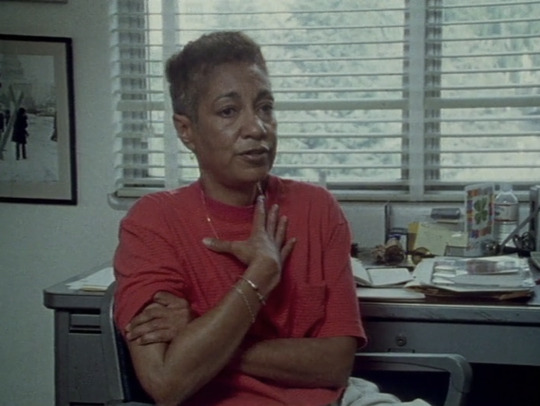
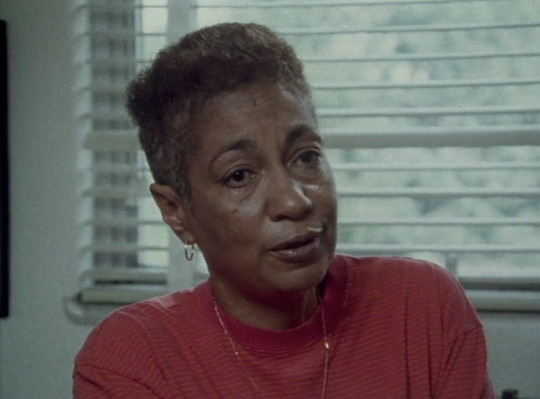
“There are two issues of our time, really, that I think amount to a litmus test for morality as far as I am concerned. One is what you are prepared to do on behalf of the Palestinian people. And the other is what are you prepared to do on behalf of gay and lesbian peoples. I really feel that those two things are co-equal fundaments in my worldview at this time.”
- June Jordan in A Place of Rage, 1991 (dir. Pratibha Parmar)
91 notes
·
View notes
Photo
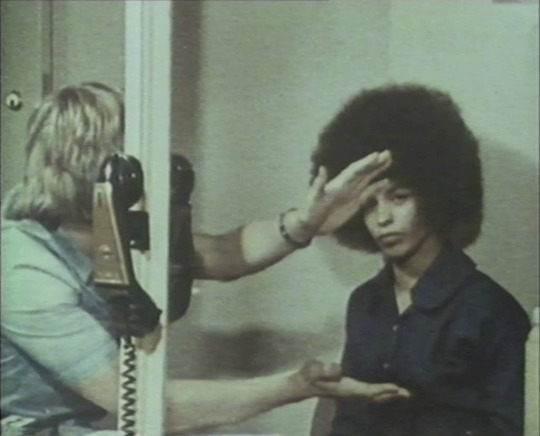
A Place of Rage, (52min, 1991), (still), Directed & Produced by Pratibha Parmar, Featuring Angela Davis, June Jordan, Trinh T. Minh-ha, and Alice Walker, Women Make Movies, New York, NY [Independent Cinema Office, London]
#art#film#docufilm#still#pratibha parmar#angela davis#june jordan#trinh t. minh ha#alice walker#women make movies
180 notes
·
View notes
Photo

Pratibha Parmar
Gender: Female
Sexuality: Lesbian
DOB: 11 February 1955
Ethnicity: Indian
Occupation: Writer, screenwriter, director, producer
#Pratibha Parmar#bipoc#qpoc#qwoc#lgbtq#female#lesbian#1955#indian#asian#poc#writer#screenwriter#director#producer
70 notes
·
View notes
Photo
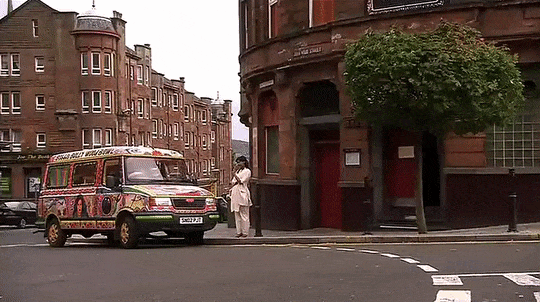



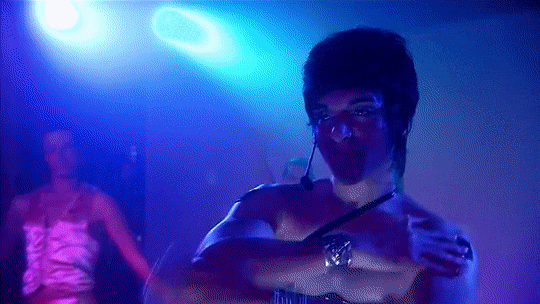



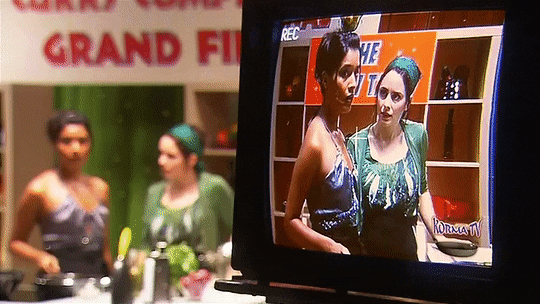

NINA'S HEAVENLY DELIGHTS (2006)
dir. Pratibha Parmar
When young Glaswegian cook Nina Shah returns home for her father's funeral after three estranged years in London, England, she begins a romantic relationship with Lisa, an old childhood friend who now owns half the late father's Indian restaurant, The New Taj. Together they seek to save the restaurant by winning the national "Best in the West Curry Competition" for a third time. Nina's mother Suman and brother Kary, however, want to sell the place to fellow restaurateur Raj, whose chef son Sanjay had been left at the altar by Nina. Lending the young women moral support is Nina's flamboyant gay friend Bobbi, and Nina's younger sister Priya.
(link in title)
#lgbt cinema#lesbian cinema#nina's heavenly delights#british cinema#lgbt#lesbian#uk#lgbt movie#lesbian movies#british movies#lgbt film#lesbian film#british film#lgbt media#lesbian media#queer cinema#european cinema#pratibha parmar#shelley conn#laura fraser#2006#00s#2000s#00s movies#00s film#2000s cinema#2000s films
173 notes
·
View notes
Video
vimeo
A PLACE OF RAGE (1991)
Pratibha Parmar
Running Time: 52 min
An exuberant award-winning documentary a film by Pratibha Parmar made its debut in 1991 yet it's content is still one of the richest and most cherished with interviews from Angela Davis, June Jordan and Alice walker. A celebration of the contributions and achievements of prominent African American women, the film features Angela Davis, June Jordan and Alice Walker. Within the context of civil rights, black power, lesbian and gay rights and the feminist movement, the trio reassesses how women like Rosa Parks and Fannie Lou Hamer revolutionized American society and the world generally.
#Pratibha Parmar#a place of rage#documentary#black american cinema#angela davis#june jordan#alice walker#film#cinema
23 notes
·
View notes
Photo
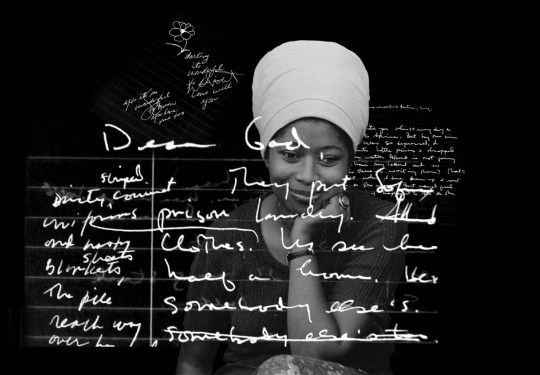


Alice Walker- Beauty In Truth, (1h 24min), Written and Directed by Pratibha Parmar, Kali Films, 2013.
Images via garadinervi
13 notes
·
View notes
Text
Sarah Schulman on “My Name is Andrea”
Sarah Schulman, earlier today--
Tonight I saw a film by old friends, whose work I love, who I respect, who I would love to work with in the future...and I found a central element of it absolutely perplexing.
The film is "My Name Is Andrea" about Andrea Dworkin, by Pratibha Parmar, Produced by Shaheen Haq, and with additional production work by Amy Scholder and by V (formerly known as Eve Ensler.) Whew- that is a list of folks I really care about.
This film- while filled with cinematic invention, bright creative visual ideas, amazing archival footage and exciting movie making- is part of this recent trend of canonizing Andrea Dworkin that I just don't understand.
Other smart people like Johanna Fateman and Martin Duberman have also been part of this wave. It involves huge emphasis on Dworkin's early feminist writings against violence- which were and are widely compelling. And Pratibha does a fantastic job of articulating these ideas and presenting them with searing impact. But like the rest of the pro-Dworkin works we have seen recently this rich representation is accompanied by a shallow overlook of her very questionable work on pornography. Why one and not the other?
At the time, the dichotomous discourse was between pornography and censorship- today of course, we have total access to pornography (except involving minors) for anyone with a laptop, while living in a society obsessed with imposing censorship on ideas, language, and historical facts in all realms of everyday life. And the porn industry has been so decentralized that the way money is made is very different than the world Dworkin lived in and theorized.So neither side of these 1980's and 90's debates actually won.
As I recall, there were three basic elements to Dworkin's role in the efforts to control pornography that could be included in any revisitation of her life and work:
First, her totalizing theories about pornography and its social role. While I think generalizing against rape (actual rape, not the metaphoric use of the word that has arisen since that time)works then and now, using that template and applying it to all commodified sexual imagery just never fit. She was an absolutist about something that just was never absolute. How she failed in using the same approach from one arena to another would be worth unpacking.
Secondly, while she and her colleague Catherine McKinnon attempted to use Civil Rights approaches to control pornography -a questionable goal in and of itself- without success, they did influence legislation like the Butler law in Canada, which caused the seizure of LGBT books, and resulted in a famous show trial in Vancouver, in which Little Sisters, a queer bookshop lost.
And third, she and McKinnon worked in coalition with Right Wing groups, a tactic being repeated by anti-trans "feminist" groups today.
All of these complex and consequential decisions should not be ignored. When Pratibha's film eventually gets to this part of Andrea's life, the coverage is short and confusing, with a great clip of Carole Vance explaining the problems with Dworkin's ideas, but then the film drops what could have been an interesting historical revisitation of these difficult questions, that I think are worthy of unpacking.
I would really like an objective assessment of what the real impact of her work on sexual imagery ultimately was, if there was any in the end. And a look back to see what charges and counter-charges in those debates turned out to be overblown and which turned out to be accurate, and which under-predictive. And we may be far enough away from those events, and in such a different landscape now, that such a look might be possible.
After all, now we live in a world with extreme sexual violence and wide access to both violent and sexual imagery at the same time that saying "gay", talking about racism in classrooms, supporting BDS, and helping women get abortions are increasingly forbidden. So we ended up with porn AND censorship. And how did that happen?
2 notes
·
View notes
Text
A conversation between Sam Huber and Max Nelson on second wave feminism and feminist thought, and recovering the presence of trans and gender non-conforming people in feminist history.
Here’s a great comment from Huber, they’re spitting flames:
“Wherever my students land on a given writer, I want them to understand that so-called TERFs weren’t the natural, inevitable inheritors of the radical feminists whose name they’ve absorbed. (Finn Enke, Emma Heaney, and Cristan Williams have done valuable scholarly work recovering a trans presence in 1970s radical and lesbian feminisms.) I feel very strongly that we shouldn’t cede even the knottiest corners of feminist history to transphobes. Feminism, to my mind, names the richest, most sustained body of thought we have about gender as both a constraining imposition and an uncontestably personal language through which we describe and express our most intimate selves. Trans and gender-nonconforming people need that history. It belongs to us, too.”
#feminism#second wave feminism#feminist history#nyrb#new york review of books#trans rights#and wrongs
1 note
·
View note
Text
watch shabana azmi being interviewed by pratibha parmar on her career here. she talks about deciding to take the role in fire around 32 minutes in.
20 notes
·
View notes
Text

new-to-me #197 - A Place of Rage
0 notes
Photo

A Place of Rage, (52min, 1991), (still), Directed & Produced by Pratibha Parmar, Featuring Angela Davis, June Jordan, Trinh T. Minh-ha, and Alice Walker, Women Make Movies, New York, NY [Club des Femmes]
#art#film#docufilm#pratibha parmar#angela davis#june jordan#trinh t. minh ha#alice walker#women make movies#1990s
52 notes
·
View notes
Photo

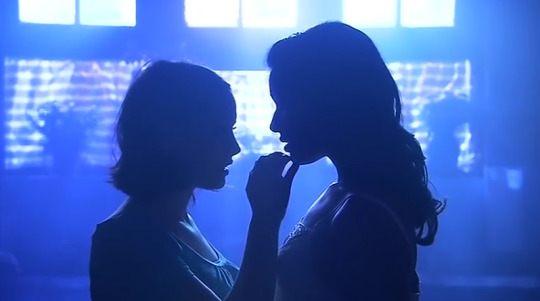


Nina’s Heavenly Delights (Pratibha Parmar, 2006)
112 notes
·
View notes
Video
instagram
cheryldunye Blessed to be working with women filmmakers who made their mark before indie-wood was even a thing; before digital was a thing. Thanks you Ava for hiring us to direct and produce Queen Sugar. @ava @queensugarown @owntv #queensugarown #queensugar @ayomentary @mzpratibha
5 notes
·
View notes
Link
#shelley conn#pratibha parmar#nina's heavenly delights#ninas heavenly delights#lgbtcinema#lgbt cinema#lgbt film#lgbt movies#wlw movies#wlw film#wlw cinema#lesbian cinema#lesbian film#lesbian films#Laura Fraser#lesbian movie#queer cinema#queer movie#queer film
2 notes
·
View notes
Photo



Nina's Heavenly Delights (2006) - dir. Pratibha Parmar
A feisty young woman returns to Glasgow to run her deceased father's curry house.
#films#nina's heavenly delights#directors#Pratibha Parmar#women directors#women film directors#women filmmakers#female directors#female filmmakers#female filmmaker friday
135 notes
·
View notes